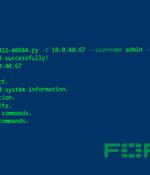Security News

A proof-of-concept exploit code has been made available for the recently disclosed critical security flaw affecting Fortinet FortiOS, FortiProxy, and FortiSwitchManager, making it imperative that users move quickly to apply the patches. "FortiOS exposes a management web portal that allows a user to configure the system," Horizon3.

Microsoft has published the exploit code for a vulnerability in macOS that could help an attacker bypass sandbox restrictions and run code on the system. The company released the technical details for the security issue, which is currently identified as CVE-2022-26706, and explained how the macOS App Sandbox rules could be avoided to allow malicious macro code in Word documents to execute commands on the machine.

A proof-of-concept code demonstrating a newly disclosed digital signature bypass vulnerability in Java has been shared online. The high-severity flaw in question, CVE-2022-21449, impacts the following version of Java SE and Oracle GraalVM Enterprise Edition -.

Three days have passed since Microsoft's latest Patch Tuesday, and CVE-2022-26809 has emerged as the vulnerability with the most exploitation potential. CVE-2022-26809 is a remote code execution vulnerability in Microsoft Remote Procedure Call runtime and affects a wide variety of Windows and Windows Server versions.

The embargo period is over for a proof-of-concept tool to test for the recently revealed BrakTooth flaws in Bluetooth devices, and the researchers who discovered them have released both the test kit and full exploit code for the bugs. BrakTooth is a collection of flaws affecting commercial Bluetooth stacks on more than 1,400 chipsets used in billions of devices - including smartphones, PCs, toys, internet-of-things devices and industrial equipment - that rely on Bluetooth Classic for communication.

New details have been revealed about a recently remediated critical vulnerability in Netgear smart switches that could be leveraged by an attacker to potentially execute malicious code and take control of vulnerable devices. The disclosure comes weeks after NETGEAR released patches to address the vulnerabilities earlier this month, on September 3.

Networking, storage and security solutions provider Netgear on Friday issued patches to address three security vulnerabilities affecting its smart switches that could be abused by an adversary to gain full control of a vulnerable device. The flaws, which were discovered and reported to Netgear by Google security engineer Gynvael Coldwind, impact the following models -.

Cisco has patched a critical security vulnerability impacting its Enterprise Network Function Virtualization Infrastructure Software that could be exploited by an attacker to take control of an affected system. The network equipment maker said it's aware of a publicly available proof-of-concept exploit code targeting the vulnerability, but added it's not detected any successful weaponization attempts in the wild.

A critical vulnerability that affects Cisco Enterprise NFV Infrastructure Software has been patched and Cisco is urging enterprise admins to quickly upgrade to a fixed version, as proof-of-concept exploit code is already available. The bug could be exploited by remote attackers to bypass authentication and log in to an affected device as an administrator.

Microsoft was quick to respond with a fix to an attack dubbed "PetitPotam" that could force remote Windows systems to reveal password hashes that could then be easily cracked. The PetitPotam PoC is a form of manipulator-in-the-middle attack against Microsoft's NTLM authentication system.